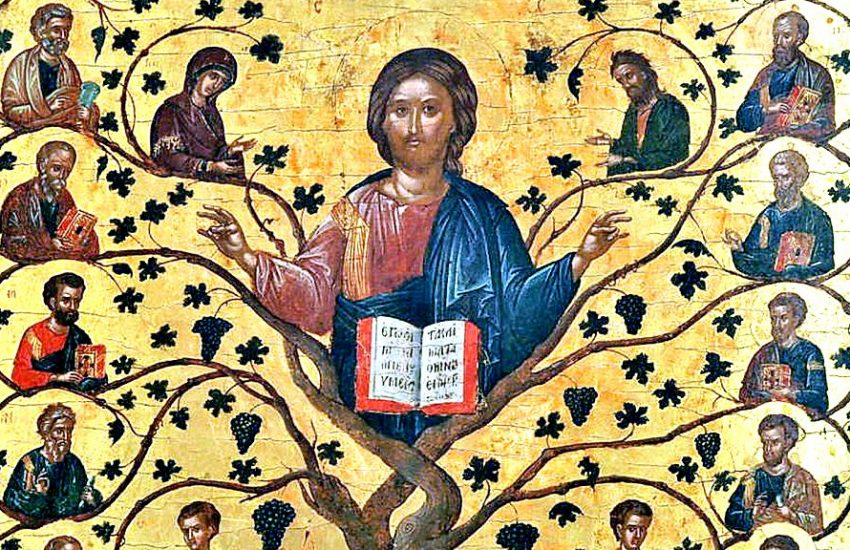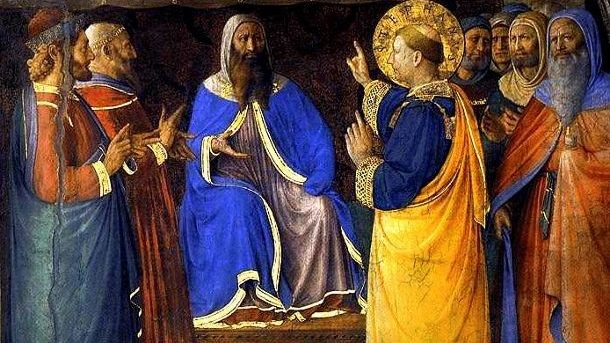The Word of God
3rd Sunday in Ordinary Time (C)
In 2019, Pope Francis declared the third Sunday in Ordinary Time to be “the Sunday of the Word of God.” This is to be a time for us to focus in a special way on the role of the scriptures in the life of the Church. In his Apostolic Letter Aperuit Illis, the Holy Father asserts that “the relationship between the Risen Lord, the community of believers and sacred Scripture is essential to our identity as Christians.” He then quotes the great St. Jerome who said, “Ignorance of the Scriptures is ignorance of Christ.” For this reason, the prayer life of every Christian ought to include the personal reading of at least some part of the scriptures each day.
The scripture readings given in the Lectionary for this Sunday’s Mass also underscore the importance of reading the scriptures together in the liturgical assembly. In the first reading from Nehemiah, the priest Ezra publicly reads the law of Moses (probably large parts of Leviticus and/or Deuteronomy) out loud to the people of Israel after the end of their Babylonian exile. He stands on a wooden platform, raised above the assembly, not just so that he might be heard, but so that people might see the scroll from which he was reading (Neh 8:5). This is the historical beginning of what we call today the Liturgy of the Word; the first part of the Mass that involves the reading of scriptures and the preaching of a homily, which derives directly from the Jewish custom of publicly reading the scriptures in the synagogue.
After hearing the Word of God, the people are sad because it is apparent just how far they have fallen from the practice of God’s law, but Ezra encourages them, “Do not be saddened this day, for rejoicing in the Lord must be your strength!” (Neh 8:10). The scriptures can often challenge us. When we see our lives reflected in the bright light of God’s wisdom, we may not always like what we see. God’s word calls us to repentance and renewal, as well as hope in the promise of salvation they proclaim.
In Ezra’s day, that promise was a long way off. But in the gospel this Sunday, we encounter Jesus in the synagogue reading from the scriptures, a passage from Isaiah referring to the Messiah. “The Spirit of the Lord is upon me, because he has anointed me to bring glad tidings to the poor” (Lk 4:18). After he reads it, Jesus proclaims, “Today this Scripture passage is fulfilled in your hearing” (Lk 4:21). The promised salvation that was so far away in Ezra’s time is near at hand for us today because the Word has become flesh and dwelt among us (Jn 1:14). That Word is Jesus Christ.
As Catholics, we believe the sacred scriptures to be inspired by God and “firmly, faithfully, and without error teach that truth which God, for the sake of our salvation, wished to see confined to the Sacred Scriptures” (Dei Verbum 11, qtd. in CCC 107). But the Catechism also says Christianity is not “a religion of the book” (CCC 108).
As Catholic Christians, we understand that the Word of God is not merely a collection of writings, even divinely inspired writings. The Word of God is Jesus Christ, who from all eternity is the Divine Logos. That Greek word, usually translated simply as “Word,” was used by the ancient philosophers to identify the underlying order of the universe. It also referred to the image in the mind of God who creates and sustains the universe and everything in it. In practical terms, a word, whether written or verbal, is a symbol. It can represent something concrete (like “chair” or “rock” or “concrete”) or it can represent an abstract concept or idea (like “justice” or “love” or “idea”).
Because God is omnipotent (all-powerful), His word doesn’t just symbolize: it creates. It is by God’s word that creation was brought into being (Gen 1:3). What has been revealed to us in Christ is that God’s creative Word is so much more than a symbol, even a supremely powerful one. God’s Word is a Person. We meet that Person in the scriptures and in the Church. We meet that Word in the sacrament of reconciliation when we receive the mercy of God. And we meet that Word most powerfully in the Eucharist when we receive His incarnate Body and Blood.
As we become more familiar with the Word of God through our study of the Old and New Testaments, we will recognize Him more easily in the sacraments, and in one another.
Further Resources
One of the best ways to encounter Christ in the scriptures is to engage in prayerful reading with a group of fellow Christians. Join one of our student-led small group Bible studies for a weekly discussion focused on the Word of God. During the Spring 2022 semester, groups meet on Mondays at 7:00 PM and Thursdays at 5:00 PM on the 2nd floor of the UC, by the blue couches.
Thanks to a generous donation, we also have a small supply of Bibles available to give away to any student on campus who needs one. You’ll find them on the shelf by the door to the chapel. Please help yourself!
From our campus ministry blog:
- “Where We Got the Bible” – a brief history of where the scriptures come from, by Deacon Matt
- “Coffee, the Rosary, and the Bible” – an imagined conversation between a Catholic & a Protestant on the relationship between the Church and the Bible
From our YouTube channel
- “How Did We Get the Bible?” – a six minute video by Deacon Matt on the history of the Biblical canon
Recommended resources from other websites:
- Read Aperuit Illis, Pope Francis’ 2019 letter instituting the Sunday of the Word of God.
- Read Dei Verbum, the Dogmatic Constitution on Divine Revelation of the Second Vatican Council.
- Read the section on Sacred Scripture in the Catechism of the Catholic Church.
- Read the US Bishop’s web page on “Understanding the Bible.”
- Read the daily lectionary scripture readings.
- How to pray with the scriptures: Lectio Divina
- Listen to the Bible in a Year podcast



